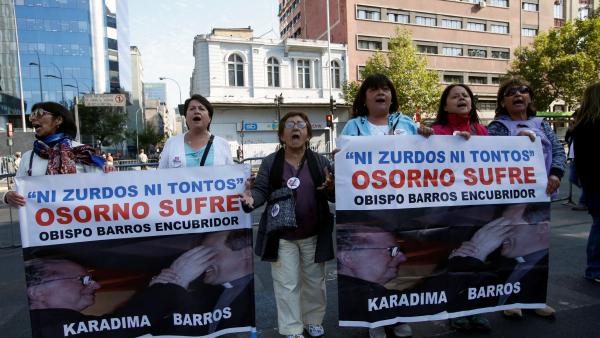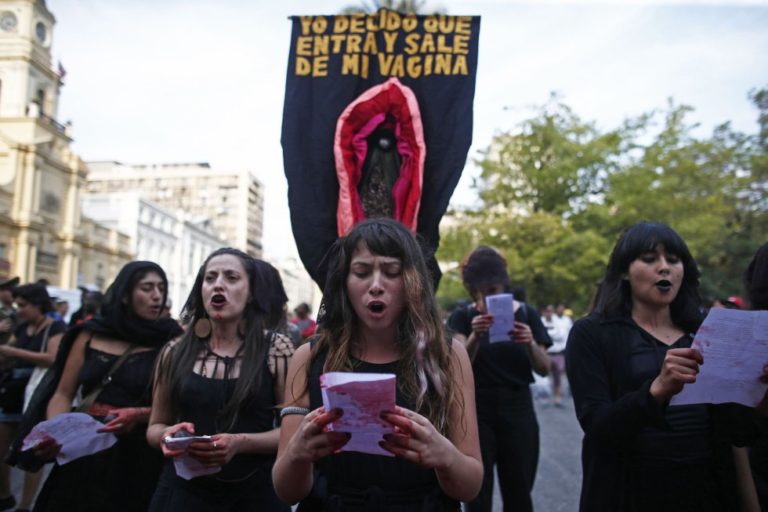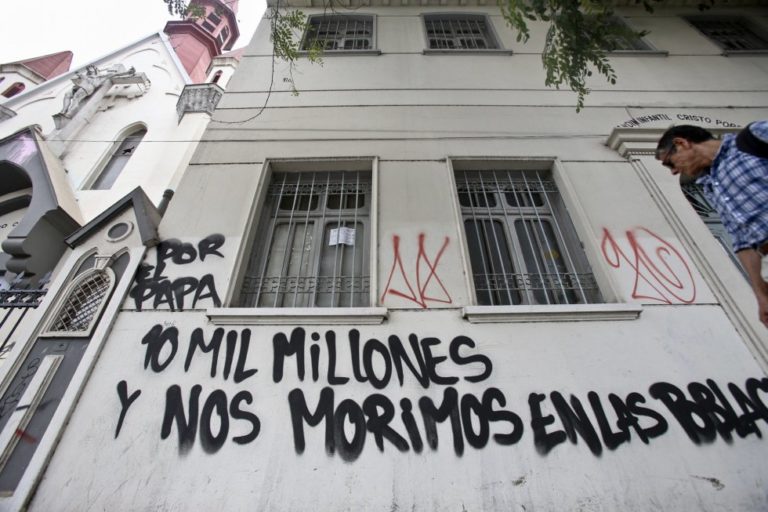
By Jaime Barrientos
Chile began 2018 with a visit from Pope Francis. The country still remembered the one paid by John Paul II who, in the midst of the military period, convoked thousands of people to the streets across the country, who answered his call to receive the pontiff. However, in 2018, things would be completely different. The Chilean Catholic Church would welcome the current pontiff in the midst of a serious crisis on its credibility due to the hierarchy’s mishandling of allegations on sexual abuse. The crisis would reach its peak when, in May 2018, the entire hierarchy would be summoned to the Vatican to reflect on the crisis and its scope. Until that date, the Catholic Church in Chile had never experienced such an all-time low. A few day past, 34 bishops presented a joint letter of resignation to the pope.
Most Chileans remember the fundamental role played by the Catholic Church during the dictatorship in protecting many men and women who were persecuted by the military. Once democracy had been restored, the Church had also played an important role in the national social and political life, often muddling in the dispute for rights. The Church was seen as a valid and legitimate actor to the ruling political class since many politicians received protection and support during the Pinochet era. This was the case from the 1990s until the divorce law approval in 2004. The Church was appreciated and heard and its arguments were often used in the national public debate. However, in that same year of 2004, several denounces against Father Fernando Karadima arose, the spiritual leader and teacher of many young people of the country’s upper class. From then on, several accusations began to be made public slowly. Some have achieved public visibility, but most did not. Now we arrive in 2018, when the country began to hear, in parallel with the #MeToo movement led by Chilean university students, a series of new complaints against several priests across the country, against members of the Marist and the Jesuit Order. The accusations continue to emerge.
Now, the way the religious hierarchy has handled these cases begins to be questioned. There is, for the first time, a great deal of pressure and contestation over the practice of cover-ups by the hierarchy, broadening the targets against the Church. The Pope has also been criticized over how he has dealt with accusations against renowned bishop Juan Barros, for covering up Father Karadima’s crime, when he was questioned about it during his visit to Chile and responded harshly, protecting Barros.

In parallel, in this same year of 2018, transgender actress Daniela Vega, “A fantastic woman” movie star, exalted the country in Hollywood, when Chile, for the first time, won the Academy Awards for Best Foreign Language Film. The “trans” term now occupies the front pages of newspapers, TVs, and radios. The visibility of transgendered people is everywhere while the gender identity bill is being debated. And the Church, which until then had little participated in the recent debate for and against such laws, spoke against the bill. Santiago city Bishop, the highest figure in the National Catholic Church hierarchy, Ricardo Ezzati, when asked about the right of transsexuals to change their legal name and sex, declared that “beyond nominalism, we must look at the reality of things. It is not because a cat is named dog, that the dog becomes a dog … The fundamental question is not just age, it is a deeper matter. ”
The criticism escalated and, from all around, targeted the Bishop, who just a few days later tried to retract his allegations. Criticism also came from within the church itself for his ineptitude and lack of tact. Shortly after, the National Prosecutor’s Office, who is investigating charges against the priests, summoned Ezzati to testify, accused of covering up sexual abuse. This would be an unthinkable all-time low for the Catholic Church in Chile. The head of the Catholic Church in Chile is being investigated and prosecuted. At the same time, the Prosecutor claims sexual abuse evidence has been tampered with and destroyed by the Church. In other words, there has been an organized cover-up method put into practice.
So far in 2018, according to a recent “disaster” report issued by the National Attorney’s Office, there are a total of 158 bishops, priests and laity who have been or are under investigation for sexual abuse in Chile since 1960. In addition, the Office assures for a total of 266 victims, 178 of whom are children and teenagers of crimes perpetrated by members of the Catholic Church, while 36 investigations are still underway and 108 have been closed. The Chilean Catholic Church lives the darkest moments of its history. And the silence is almost absolute. The Prosecutor’s Office carries on with the investigation proceedings. In addition, the negative criticism towards the Church is relatively unanimous and, for the first time, it surprised our country to watch a church in silence. Some priests call for a total renewal on the hierarchy. The Pope has not yet decided on the status of several of the bishops who presented their resignations during his visit to the Vatican in May.
The country, however, carries on. In 2018, President Sebastian Piñera (center-right) assumed for the second time the country’s mandate. Consequently, neoliberal policies are being stricken down. In addition, the approval of the gender identity bill is currently being discussed and the feminist movement is demanding the expansion of the three causes provided by the abortion law, which has even been answered with much violence from groups of the extreme right in the march which has taken place on July 25. On that occasion, three women were violently assaulted and stabbed, unprecedented in previous demonstrations in the country. This fact even came to be justified by some groups, which had never happened in the country.

But the Catholic Church itself, which, previously opposed so much in matters of rights, today cannot raise its head, articulate its voice or oppose these new developments in the field of rights for Chilean. Since, unlike what happened in other countries, in Chile the coup has been resounding and has left on the floor a Catholic Church that, normally, stood firm. Many compare the situation of the Chilean Church with what happened years before in the USA, that is, with a total schism.
Whatever happens, after this crisis the Chilean Catholic Church will never be the same after this crisis and will never again occupy the place that once occupied in the national life of this country. Chileans and Chileans look forward to changing and we are aware that the social and political geography of the country, with a discredited and delegitimized Church, will never be the same again.
—
Jaime Barrientos is a doctor in Social Psychology and currently Associate Professor at the Faculty of Psychology at the University Alberto Hurtado. His research topics focus on homophobic violence, the impact of prejudice and discrimination in the mental health of gay men and lesbians. In addition, he has conducted research on MsM and MtF in Chile and has also adapted and validated different measures on homophobic violence in the country. His most recent book is Homophobic Violence in Latin America and Chile (El buen aire, 2015).
